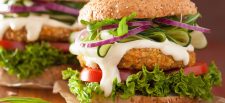Post-Brexit trade barriers threaten to disrupt the supply and costs of food products, according to a new report from the House of Lords’ EU Energy and Environment Sub-Committee.
The report, Brexit: food prices and availability, suggests that around 30% of food eaten in the UK currently comes from the EU: this means that once Brexit happens, there is a possibility that complications will occur with regards to both supplies and consumption.
Being part of the EU customs union has meant food from the EU can be imported with no tariffs or customs barriers.
Whilst the UK Government hopes to negotiate a trade agreement to allow tariff-free and ‘frictionless’ imports of food to continue, this is not a guarantee.
The committee has found that even in the ‘best case scenario’, with no tariffs and few customs barriers, international rules would oblige the UK to conduct more customs and borders checks than is currently the case.
If an agreement cannot be negotiated by the time the UK leaves the EU the increase in tariffs could lead to significant price rises for consumers, whilst the additional customs workload could choke the UK’s ports and airports and significantly disrupt food deliveries.
In addition to the 30% of food that the UK imports from the EU, another 11% of food comes from non-EU countries as part of EU trade agreements. There are 40 of these agreements in place, covering 56 different countries.
The committee is calling on the Government to seek agreements with these countries so that the status quo can be maintained during the Brexit transition period, as well as undertaking the negotiations that will need to happen to maintain this important aspect of the UK’s food supply post-December 2020.
Lord Teverson, chairman of the EU Energy and Environment Sub-Committee, commented: “Throughout our inquiry there was a striking contrast between Government confidence and industry concerns. The Minister may not be worried about the potential for Brexit to impact on the price and availability of food, but the representatives of the food and farming industry, importers, port authorities and consumer organisations were vocal in their concerns.
“The Government has some important choices to make. They have said they want to maintain high food standards but also that they would be willing to have minimal customs checks to avoid disruption at borders.”
Teverson concluded: “The UK needs a comprehensive food policy, to tackle these complex issues, and we urge the Government to produce one with some urgency.”









